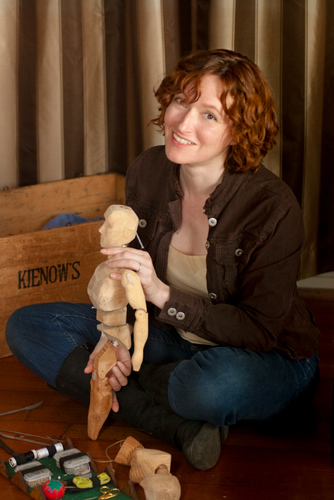Mary Robinette Kowal is most recently the author of Shades of Milk and Honey.

Listen: Play in new window | Download (Running Time: 45:13 — 41.4MB)
Condition of Mr. Segundo: Confusing magic with milkshakes.
Author: Mary Robinette Kowal
Subjects Discussed: [List forthcoming]
EXCERPT FROM SHOW:
Correspondent: I wanted to start with the specific language in this book. The specific Jane Austen template that you laid out. You took great care to mimic Jane Austen’s particular spellings. You used chuse with a U instead of choose with double O. Shew instead of show. Surprize and teaze spelled with a Z. But on the other hand, you didn’t, for example, hyphenate today. And things along those lines. And nuncheon! Jane Austen never used nuncheon!
Kowal: That’s not true. She used it twice.
Correspondent: When? And where?
Kowal: She used it in Lady Susan and Sense and Sensibility.
Correspondent: Ah, okay. Well, in any event, the hard choices of vocabulary. I wanted to first of all start with how this came about. Why go ahead and emulate this language? Was the idea here to create a series of limitations with which to approach a long-form novel? What came first here?
Kowal: I thought that language reflects society very closely. The reason I wound up using some of her spellings, it’s really an affectation. I am trying to pretend that this is something that could have been written then. I deviated from her spellings in places where I thought it would be confusing. In places where I didn’t feel the word was going to appear often enough for a reader to get used to it. An example of a word that was confusing was that she spelled stayed – like stayed at home – S-T-A-I-D.
Correspondent: That’s right.
Kowal: Which is a different word now. The word sofa appears, I think, once in the novel. And she spelled it S-O-P-H-A. And there’s not actually a reason to stop people. I actually thought that they were going to make me change all of the spellings. But I guess you can think of it as dressing up in Regency clothes, but remembering of course that it’s still going to a costume party.
Correspondent: By “they,” are you referring to Liz Gorinsky?
Kowal: Yes.
Correspondent: Or the copy editors?
Kowal: Well, Liz Gorinsky. The production department. I thought that someone in the editing line was going to say, “Hey, we need to change that.” The copy editor, once we had decided with Liz and marketing to keep the spellings — and we did lift out some of them – then I gave the copy editor a style sheet that said, “These are the correctly misspelled words. Please do not change them.”
Correspondent: Which words didn’t make the cut? I’m curious.
Kowal: Sopha. Staid. All of the to-days and to-morrows.
Correspondent: Oh! So those were originally spelled that way in your original draft.
Kowal: Yeah.
Correspondent: Okay. Wow.
Kowal: I can’t remember what some of the others were. But I did a find/replace. I can’t remember where I found it, but I found a Jane Austen spelling list. And I went through and did a find/replace on everything. And then they went back and undid that. So it’s funny. There’s a couple of places. I know that there’s at least one chuse that we missed and it’s still spelled with two Os. But you know.
Correspondent: Well, goodbye to that, I suppose.
Kowal: You know. Second edition.
Correspondent: Well, this is interesting. Because I’m wondering if it took you several practice tries to write in this particular meticulous style.
Kowal: I would read a chapter of Jane Austen and then write a chapter of Jane Austen. So I was reading Persuasion while I was writing this. And one of the things I picked up from the puppetry is that I frequently have to mimic somebody else’s style. So once I decided to do this, I sat down and started reading Austen. And then the reason that I was writing right after finishing reading a chapter was because I knew that the language would stick and the rhythms would stick. But I don’t really think I did a practice run.
Photo: Annaliese Moyer
Listen: Play in new window | Download (Running Time: 45:13 — 41.4MB)
1 Comment